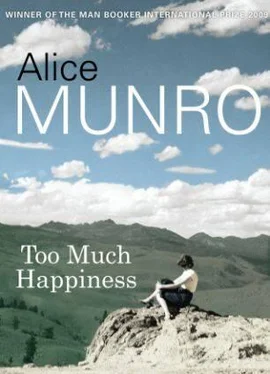And she too, just now, had been despising him.
The room was shabby, but when you looked at it closely you saw that it had been cleaned as well as possible. A few cooking pots hung from nails on the wall. The cold stove had been polished, and so had the bottoms of those pots. It occurred to her that there might be a woman with him, even now.
He was talking about Clemenceau, saying they were on good terms. He was ready now to brag about a friendship with a man she would have expected him to accuse of being in the pay of the British Foreign Office (though she herself believed this false).
She deflected him by praising the apartment’s tidiness.
He looked around, surprised at the change of subject, then slowly smiled, and with a new vindictiveness.
“There is a person I am married to, she takes care of my welfare. A French lady, I am glad to say, she is not so garrulous and lazy as the Russians. She is educated, she was a governess but was dismissed for her political sympathies. I am afraid I cannot introduce you to her. She is poor but decent and she still values her reputation.”
“Ah,” said Sophia, rising. “I meant to tell you that I too am marrying again. A Russian gentleman.”
“I had heard that you went about with Maksim Maksimovich. I did not hear anything about a marriage.”
Sophia was trembling from sitting so long in the cold. She spoke to Urey, as cheerfully as she could.
“Will you walk with your old aunt to the station? I have not had a chance to talk to you.”
“I hope I have not offended you,” said Jaclard quite poisonously. “I always believe in speaking the truth.”
“Not at all.”
Urey put on his jacket, which she now saw was too big for him. It had probably been bought in a rag market. He had grown, but he was no taller than Sophia herself. He might not have had the right food at an important time in his life. His mother had been tall, and Jaclard was tall still.
Though he had not seemed eager to accompany her, Urey began to talk before they had reached the bottom of the stairs. And he had picked up her bag immediately, without being asked.
“He is too stingy to even light a fire for you. There is firewood in the box, she brought some up this morning. She is as ugly as a sewer rat, that’s why he didn’t want you to meet her.”
“You shouldn’t talk that way about women.”
“Why not, if they want to be equal?”
“I suppose I should say ‘about people.’ But I don’t want to talk about her or your father. I want to talk about you. How are you doing with your studies?”
“I hate them.”
“You cannot hate all of them.”
“Why can’t I? It isn’t at all difficult to hate all of them.”
“Can you speak Russian to me?”
“It’s a barbaric language. Why can’t you speak better French? He says your accent is barbaric. He says my mother’s accent was barbaric too. Russians are barbaric.”
“Does he say that too?”
“I make up my own mind.”
They walked for a time in silence.
“It’s a bit dreary in Paris this time of year,” Sophia said. “Do you remember what a good time we had that summer at Sèvres? We talked about all kinds of things. Fufu remembers you still and talks about you. She remembers how much you wanted to come and live with us.”
“That was childish. I didn’t think realistically at that time.”
“So have you now? Have you thought of a lifework for yourself?”
“Yes.”
Because of a taunting satisfaction in his voice she did not ask what this might be. He told her anyway.
“I’m going to be an omnibus boy and call out the stations. I got a job doing that when I ran away at Christmastime, but he came and got me back. When I am one year older he won’t be able to do that.”
“Perhaps you would not always be happy calling out the stations.”
“Why not? It’s very useful. It’s always necessary. Being a mathematician isn’t necessary, as I see it.”
She kept silent.
“I could not respect myself,” he said. “Being a professor of mathematics.”
They were climbing to the station platform.
“Just getting prizes and a lot of money for things nobody understands or cares about and that are no use to anybody.”
“Thank you for carrying my bag.”
She handed him some money, though not so much as she had intended. He took it with an unpleasant grin, as if to say, You thought I’d be too proud, didn’t you? Then he thanked her, hurriedly, as if this was against his will.
She watched him go and thought it was quite likely she would never see him again. Aniuta’s child. And how like Aniuta he was, after all. Aniuta disrupting almost every family meal at Palibino with her lofty tirades. Aniuta pacing the garden paths, full of scorn for her present life and faith in her destiny which would take her into some entirely new and just and ruthless world.
Urey might change his course; there was no telling. He might even come to have some fondness for his aunt Sophia, though probably not till he was as old as she was now, and she long dead.
Sophia was half an hour early for her train. She wanted some tea, and lozenges for her throat, but she could not face the waiting in line or the speaking French. No matter how well you can manage when you are in good health, it does not take much of a droop of spirits or a premonition of sickness to send you back to the shelter of your nursery language. She sat on a bench and let her head drop. She could sleep for a moment.
More than a moment. Fifteen minutes had passed by the station clock. There was a crowd gathered now, a great deal of bustle around her, baggage carts on the move.
As she hurried towards her train she saw a man wearing a fur hat like Maksim’s. A big man, in a dark overcoat. She could not see his face. He was moving away from her. But his wide shoulders, his courteous but determined manner of making way for himself, strongly reminded her of Maksim.
A cart piled high with freight passed between them, and the man was gone.
Of course it could not be Maksim. What could he be doing in Paris? What train or appointment could he be hurrying towards? Her heart had begun to beat unpleasantly as she climbed aboard her train and found her seat by a window. It stood to reason that there should have been other women in Maksim’s life. There had been, for instance, the woman he could not introduce Sophia to, when he refused to invite her to Beaulieu. But she believed that he was not a man for tawdry complications. Much less for jealous fits, for female tears and scoldings. He had pointed out on that earlier occasion that she had no rights, no hold on him.
Which surely meant that he would consider she had some hold now, and would have felt it beneath his dignity to deceive her.
And when she thought she saw him she had just wakened out of an unnatural unhealthy sleep. She had been hallucinating.
The train got itself together with the usual groans and clatter and slowly passed beyond the station roof.
How she used to love Paris. Not the Paris of the Commune where she had been under Aniuta’s excited and sometimes incomprehensible orders, but the Paris she had visited later, in the fullness of her adult life, with introductions to mathematicians and political thinkers. In Paris, she had proclaimed, there is no such thing as boredom or snobbishness or deception.
Then they had given her the Bordin Prize, they had kissed her hand and presented her with speeches and flowers in the most elegant lavishly lit rooms. But they had closed their doors when it came to giving her a job. They would no more think of that than of employing a learned chimpanzee. The wives of the great scientists preferred not to meet her, or invite her into their homes.
Читать дальше












